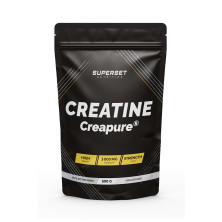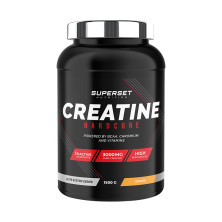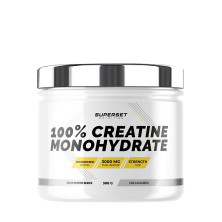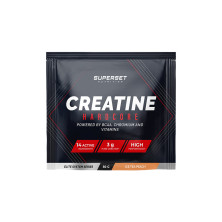5 products
Creatine is a natural substance found in the body that helps provide energy to muscles. It is considered one of the most popular nutritional supplements for muscle building, strength development and performance enhancement.
What is creatine?
Creatine is a combination of 3 amino acids (arginine, glycine and methionine) that can be synthesized by the body. It is present in our muscles and in our brain. Stored in the form of creatine phosphate in the muscles, it allows an immediate release of energy used for muscle contraction during successive intense and short duration efforts.
What is it used for?
A creatine deficiency can lead to muscle fatigue and a decrease in physical performance. Creatine acts as an immediately available energy bonus during efforts and small series of high intensities. The phosphocreatine naturally present in our muscles represents 70% of the creatine present in our muscle cells. It releases energy by giving up a phosphate to the ADP to potentiate the energy, while the ATP releases its phosphates by producing energy. Energy synthesis is therefore maintained before glucose and glycogen stores take over. The more the muscles have in reserve, the more they will be able to regenerate their ATP, so they will be able to maintain an intense effort in a longer time.
How is it assimilated by the body?
It is best taken with a sweetened drink for optimal results, because the insulin spike that is produced transports the creatine to the muscles. Some are already sweetened for a better assimilation with water. Its assimilation depends on the storage capacity of the muscles which varies from one person to another. If the creatine stock is already at its maximum, it will not be possible to put some in reserve for later.
What are the effects of creatine in bodybuilding?
In bodybuilding, creatine is recommended for muscle mass gain, strength and power gain, muscle contraction, increased energy and improved recovery.
Energy comes from ATP. When energy demand is high, the phosphate molecule is transferred by creatine phosphate to ADP (adenosine diphosphate) to convert it into ATP (adenosine triphosphate). However, this chain is short-lived, hence the interest in recycling this molecule to have an "emergency energy" effect and increase resistance to fatigue. With supplementation, energy reserves are then greater for short and intense efforts.
Creatine is recommended for strength sports and also improves recovery.
In the short term, strength gain is almost always followed by a gain in body weight due to water retention in the intracellular environment. This is not a gain in muscle mass. You can therefore lose everything when you stop taking creatine.
In the long term, the gain in strength will make it possible to train heavier and to slightly prolong a major effort during intense, short-duration exercises, which will result in a gain in lean mass in the long term. The gain in muscle mass appears much later than the gain related to water retention.
Creatine does not build new muscle fibers but allows you to train harder which results in a gain of muscle mass in addition to the gain of volume from water retention.
















